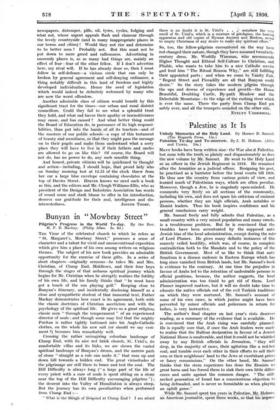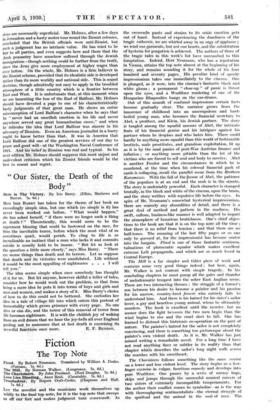Palestine as It :Is
Palestine 'To-day and To-morrow. By J. H. Holmes. (Allen
and Unwin. 10s.) •
MANY-books have been written sine the War about Palestine. but .none tells the truth so plainly and dispassionately as does _the new volume by Mr. SaMuel. He went to the Holy Land as an officer in the Jewish Regiment in 1918. He remained 'after the Armistice as a judicial officer. Resigning his post, he practised as a barrister before the local courts till 1928. He thus_ saw the country from various points of view, and learned- much of Palestinian ways, which are often peculiar. Moreover, though a Jew, he is singularly open-minded. He comments very freely on:all sections of the community, including his own, and does not spare his criticism of eminent persons, whether they are high officials, Arab notables or Zionist leaders. Thus his book inspires confidence and his general conclusions carry weight.
Mr. Samuel freely and fully admits that Palestine, as a small country with a very mixed population and many creeds, is a troublesome problem. But he is convinced that the troubles have been accentuated by the supposed anti- Jewish bias of the local administration, except during the rule, of Lord Plumer. He gives many definite instances of this scarcely veiled hostility, which was, of course, in complete contradiction both to the Mandate and to the policy of the British Government. Most of us like to think that anti- Semitism is a disease endemic in Eastern Europe which has long since vanished from British lands, but Mr. Samuel's book is evidence to the contrary. At one time the prejudice in favour of Arabs led to the retention of undesirable persons in official positions, because, the author suggests, the local administration was too timid to get rid of them. Lord Plumer improved matters, but it will no doubt take time to educate the native officials out of the evil Turkish traditions on which they were nurtured. Mr. Samuel's account of some of his own cases, in which justice might have been perverted by minor officials and policemen in return for bribes, is very instructive.
The author's final chapter on last year's riots deserves reading, as a summary of the evidence that is available. He is- convinced that the Arab rising was carefully planned. He is equally sure that, if once the Arab leaders were made to realize that the Balfour declaration in favour of a Jewish National Home is unalterable, and that it could not be whittled away by any British officials in Jerusalem, " they will drop, in the majority_ of cases, their agitation like a red-hot coal, and tumble over each other in their efforts to sell their own or their neighbours' land to the Jews at exorbitant prices or fancy commissions." On the other hand, Mr. Samuel thinks that the stern experience has done the Zionists no _great harm and has forced them to sink their own little differ- ences and unite against the common danger. " The stiff- necked generation of Israel has a conscientious objection to being defrauded, and is never so formidable as when playing an uphill game."
While Mr. Samuel spent ten „years in Palestine, Mr. Holmes,
• • • • -■• an American journalist, spent three weeks, so that his jinpres- sions are necessarily superficial. Mr. Holmes, after a few days in Jerusalem and a hasty motor tour round the Zionist colonies, concluded that the British officials were anti-Zionist, but such a judgment has no intrinsic value. He has tried to be fair to all parties, and even suggests here and there that the Arab peasantry have somehow suffered through the Jewish immigration—though nothing could be further from the trutli, since the Jews give more employment at higher wages than ever before. On the whole, Mr. Holmes is a firm believer in the Zionist scheme, provided that its idealistic side is developed rather than its more worldly and national side. This is sound doctrine, though admittedly not easy to apply in the troubled atmosphere of a little country which is a frontier between East and West. It is unfortunate that, at this moment when we are lamenting the loss of the Earl of Balfour, Mr. Holmes should have devoted a page to one of his characteristically hasty judgments of that great man. He shows an entire misconception of Lord Balfour's character when he says that he " never had an unselfish emotion in his life and never anywhere served any great humanitarian cause," and when he ridicules the idea that Lord Balfour was sincere in his advocacy of Zionism. Even an American journalist in a hurry ought to know better, than that. It was in America that Lord Balfour did one of the greatest services of our day to peace and good will—at the Washington NaVal Conference of 1921. And his belief in Zionism was real and typical. In his next edition Mr. Holmes should suppress this most unjust and malevolent criticism which his Zionist friends would be the first to resent and regret.











































 Previous page
Previous page